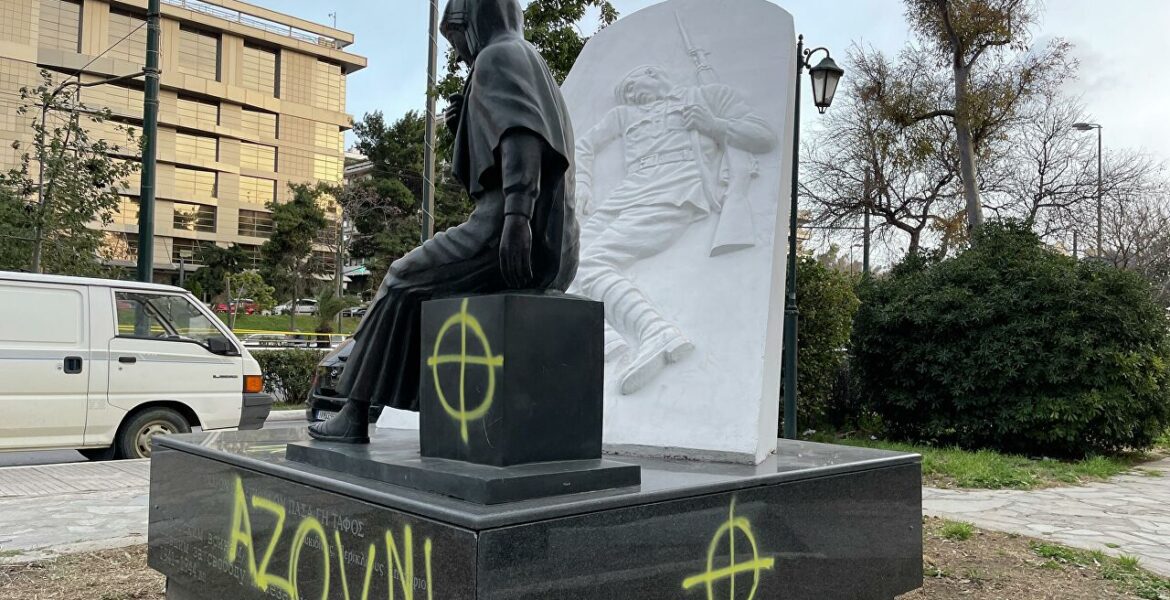The Russian Foreign Ministry in a statement condemned the desecration of a Soviet War Memorial in the Athens neighbourhood of Kallithea with graffiti of the Ukrainian neo-Nazi Azov Battalion.
"We are indignant over the desecration of the Monument to Soviet Soldiers in the centre of Athens. They lost their lives fighting for the freedom and independence of Greece in 1941-1944," the Russian Foreign Ministry said in a statement.
"This monument is one of the central venues for celebrating Victory Day every year.
"Unidentified individuals painted Nazi logos on the monument in yellow and wrote the title of the Ukrainian nationalist battalion Azov on it.
"Over the years, this battalion conducted punitive operations in Donbass and committed crimes against Mariupol civilians.
"This case is unprecedented for Greece whose people offered fierce resistance to the German Nazi invaders during World War II. Greeks sincerely appreciate the memory of the Soviet soldiers who freed Europe from the Nazis.
"We strongly condemn this crime. We consider it a direct consequence of the anti-Russia hysteria unleashed by the local media.
"The continuous lop-sided and patently distorted coverage of events in Donbass, and support for the Kiev regime have let those who are willing to bury Russian-Greek common history and memory off the leash, all for the sake of questionable goals.
"We are grateful to the empathic Greek citizens and Russian compatriots for their prompt cleanup of the monument.
"We urge the Greek authorities to find and strictly punish the vandals to prevent a repetition of such unacceptable incidents.
"The Russian Embassy in Athens immediately sent a relevant note to the Foreign Ministry of Greece. We are waiting for an update on the results of the investigation."


For their part, the Greek Ministry of Foreign Affairs unequivocally condemned the desecration of the monument.
“We condemn the desecration of a monument dedicated to the memory of three Soviet soldiers who were executed by the Nazi occupation forces in the summer of 1944," the Greek Foreign Ministry said.
“Greece, a country that suffered from the Nazi occupation, is particularly sensitive in protecting the memory of the victims of Nazism and condemns any use of symbols from this dark period of history," the statement added.
READ MORE: Who is the Pontian Greek fighting in Mariupol against the Azov Battalion?
Azov Special Operations Detachment (Ukrainian: Окремий загін спеціального призначення «Азов»), or Azov Battalion, is a right-wing extremist and neo-Nazi unit of the National Guard of Ukraine, based in Mariupol, in the Azov Sea coastal region.
In 2014, the regiment gained notoriety after allegations emerged of torture and war crimes, as well as neo-Nazi sympathies and usage of associated symbols by the regiment itself, as seen in their logo featuring the Wolfsangel, one of the original symbols used by the 2nd SS Panzer Division Das Reich.
Representatives of the Azov Battalion say that the symbol is an abbreviation for the slogan Ідея Нації (Ukrainian for “National Idea”) and deny connection with Nazism.
In 2014, a spokesman for the regiment said around 10–20% of the unit were neo-Nazis.
READ MORE: Greece announces willingness to host Ukrainian refugees.
In 2018, a provision in an appropriations bill passed by the U.S. Congress blocked military aid to Azov on the grounds of its white supremacist ideology; in 2015, a similar ban on aid to the group was overturned by the Congress.
Members of the regiment come from 22 countries and are of various backgrounds.
More than half of the regiment’s members speak Russian and come from eastern Ukraine, including cities of Donetsk and Luhansk.
The unit’s first commander was far-right nationalist Andriy Biletsky, who led the neo-Nazi Social-National Assembly and Patriot of Ukraine.
In its early days, Azov was a special police company of the Ministry of Internal Affairs, led by Volodymyr Shpara, the leader of the Vasylkiv, Kyiv, branch of Patriot of Ukraine and Right Sector.
In 2018, the U.S. House of Representatives also passed a provision blocking any training of Azov members by American forces, citing its neo-Nazi connections.
The House had previously passed amendments banning support of Azov between 2014 and 2017, but due to pressure from The Pentagon, the amendments were quietly lifted.
This was protested by the Simon Wiesenthal Center which stated that lifting the ban highlighted the danger of Holocaust distortion in Ukraine.
READ MORE: Dendias blasts Russia’s use of Chechen fighters in Greek-founded city of Mariupol.


